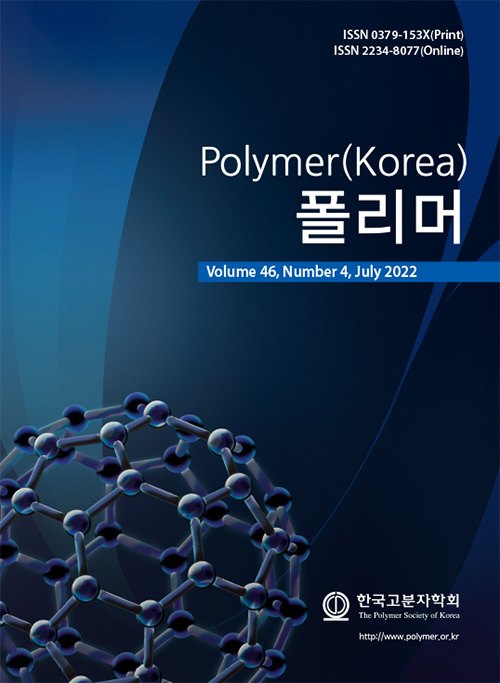- Studies on the Optimizing the Properties of Thermoset Polyurethane Resin for In-mold Coating
Department of Applied Chemistry, Hanyang University, Ansan, Gyeonggi-do, 15588, Korea
*Department of Chemical and Molecular Engineering, Hanyang University, Ansan, Gyeonggi-do, 15588, Korea- 인몰드 코팅용 열경화성 폴리우레탄 수지의 물성 최적화 연구
한양대학교 응용화학과, *한양대학교 화학분자공학과
Reproduction, stored in a retrieval system, or transmitted in any form of any part of this publication is permitted only by written permission from the Polymer Society of Korea.
The thermoset polyurethanes for in-mold coating system were prepared by using XP 2488, a polyester polyol, and C 1100, a polycarbonate diol, as polyols and Desmodur N 3600, a hexamethylene diisocyanate trimer-type, as a curing agent. It was revealed that tensile strength, elongation at break increased with increasing content of XP 2488. Polyurethanes prepared with C 1100 content of 25 wt% showed the highest value of adhesion (Class 0). Thermal and light stability increased with increasing C 1100 in the polyurethanes. And polyurethane prepared with a polyol consisting of 25 wt% XP 2488 and 75 wt% C 1100 exhibits an excellent self-healing ability, i.e. the scratch formed on the surface can be repaired instantly.
인몰드 코팅 시스템에 적용할 수 있는 열경화성 폴리우레탄에 대한 최적화 연구를 진행하였다. 폴리에스터 폴리올인 XP 2488과 폴리카보네이트 디올인 C 1100을 폴리올로 trimer type hexamethylene diisocyanate인 Desmodur N 3600을 경화제로 사용하여 제조하였다. 제조된 폴리우레탄의 인장물성은 XP 2488의 함량이 증가될수록 인장강도 및 파단신율 값이 증가하였다. 유리전이온도와 Shore D hardness도 XP 2488 함량이 증가될수록 증가되었으며, XP 2488만으로 제조된 폴리우레탄이 가장 높은 유리전이온도와 hardness를 나타내었다. 부착특성은 C 1100 함량 25 wt% 이상인 경우 Class 0으로 가장 양호한 결과를 나타내었고, 내열 및 내광성능은 C 1100의 함량이 증가될수록 우수한 결과를 보였다. 그리고, XP 2488과 C 1100을 25 wt%/75 wt% 조성의 비율로 혼합하여 제조된 도막은 스크래치가 가해진 후 즉시 복원되어 자가복원특성이 우수함을 알 수 있었다.
Keywords: thermoset polyurethane, in-mold coating, self-healing, hexamethylene diisocyanate trimer-type, tensile strength, elongation.
- Polymer(Korea) 폴리머
- Frequency : Bimonthly(odd)
ISSN 0379-153X(Print)
ISSN 2234-8077(Online)
Abbr. Polym. Korea - 2023 Impact Factor : 0.4
- Indexed in SCIE
 This Article
This Article
-
2022; 46(4): 484-490
Published online Jul 25, 2022
- 10.7317/pk.2022.46.4.484
- Received on Mar 11, 2022
- Revised on Apr 9, 2022
- Accepted on Apr 21, 2022
 Correspondence to
Correspondence to
- Hakjune Rhee
-
Department of Chemical and Molecular Engineering, Hanyang University, Ansan, Gyeonggi-do, 15588, Korea
- E-mail: hrhee@hanyang.ac.kr










 Copyright(c) The Polymer Society of Korea. All right reserved.
Copyright(c) The Polymer Society of Korea. All right reserved.